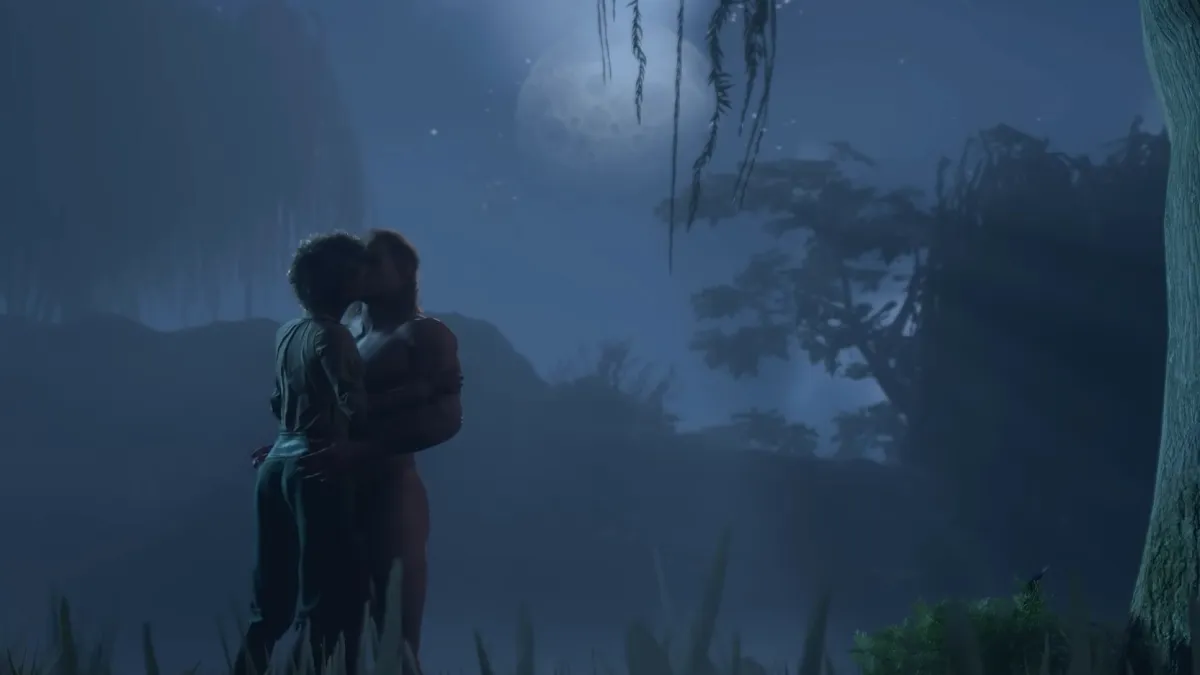Warning: This article about video game romances contains spoilers for the Mass Effect, Uncharted, and The Last of Us series.
Obsidian Entertainment game director Carrie Patel recently told IGN that the upcoming RPG Avowed won’t have romance options for its characters. That’s good.
Patel explained that implementing romances in video games is a lot of work: extra voice lines, animation, and writing that many players may never see. Multiply that by however many characters a game has, then cram all that content in alongside quests, storylines, combat, menus, and all the other things stuffed into video games. It’s a lot to juggle.
It’s too much to juggle, and the medium can’t handle it. Video game romances condense the experience of falling in love into logic-driven and/or statements that only move forward to one of two conclusions: sex or nothing.
Of course, I’m generalizing. Not all video games are so binary or confused, and not all game romances lead to sex, but many of them do — especially famous examples like Mass Effect and Baldur’s Gate 3. In Mass Effect, your romance questline ends in sex the night before the big battle — three times if you play your cards right, one for every game in the trilogy.
And who do you get to romance in Mass Effect? Well, there’s a boy, a girl, and an alien who looks and sounds like a human girl. The boy only kisses girls, the girl only kisses boys, but the alien will kiss boys or girls because why not other bisexuals while we’re creating our heteronormative macho space fantasy?
I’m picking on Mass Effect because it’s an example of what bothers me the most about game romances: appropriateness. In the first Mass Effect, you’re the commanding officer of a starship. All three people you can romance work for you, either as subordinate officers or a scientist coded as young and inexperienced. In the modern US Navy, from which Mass Effect takes a lot of inspiration, the CO of a ship fraternizing with a junior officer over whom they have direct command is a major no-no, not the least of which because it makes it impossible to guarantee objectiveness in combat.
Mass Effect puts this test right in front of the player. One of the game’s most infamous choices is to let one crew member die. And guess who your options are? I wonder how many people sacrificed the character they were planning to bang?
(In a win for bisexuals everywhere, the femme-coded alien who swings both ways is not eligible for death.)
Mass Effect‘s view on sex and relationships is clear: these are not people. They are dialogue trees that exist to be seduced, rejected and even killed. Be persistent and pick the correct choice enough times, and anyone will bone you.
I’ll lay off Mass Effect and its developers at BioWare for a bit. To be fair, their representation got better as the Mass Effect and Dragon Age series went on, but they still have a fundamental issue: score points; win prize.
Naughty Dog doesn’t do this. Naughty Dog’s modern franchises, Uncharted and The Last of Us, weave relationships into their stories from the beginning. Nate and Elena’s relationship starts as action movie blockbuster “guy gets the girl” BS, but it evolves over four Uncharted games. Uncharted 4 is a soulful, challenging exploration of what happens when two people don’t fit together as well as they thought and how much damage selfishness and nostalgia can do to a romantic partnership. The character of Chloe Frazer, introduced in Uncharted 2, is an obvious “other woman” stereotype: a street-smart, sexy, seductive thief with an implied sexual history with Nate.
The trope isn’t subtle and even comes across in Chloe and Elena’s design: Chloe is dark-haired and dressed in dark tones and reds, like a succubus, whereas Elena is blonde, fair-skinned, and wears light-coloured clothing. Thank god there’s no “branching path” option where Nate can choose between those two women. “Forcing” the player to choose Elena allowed Naughty Dog to create a sophisticated story about relationship resilience.
Every decision in both The Last of Us Part 1 and 2 is driven by character relationships. The quality of the storytelling in these games isn’t simply due to excellent writing and performances (lots of games have those) because Naughty Dog understands that good stories aren’t quality ingredients tossed in a blender to make blitzed-out story smoothies, but Michelin-starred feasts where every component adds to a greater experience. When your story is so driven by relationships, there’s no room for player choice that could diminish the power of those relationships.
Imagine The Last of Us Part 2 with a BioWare-style romance system. In the cutscene at the end of Seattle Day One, Dina reveals to Ellie that she’s pregnant and the two have a big fight. The player regains control of Ellie and immediately showers Dina with gifts they’ve found, pushing Ellie and Dina’s “relationship score” past a certain threshold. In the face of all that math, Dina tearfully apologizes and all that dramatic tastiness is liquified in the name of player agency.
Dramatic potency isn’t the only thing we lose when we gamify romance. Video games are no longer sold exclusively as violence-fuelled power fantasies for men, but that legacy remains. Video game romances remain buffets of sexual partners offered to the player to accept or discard as they see fit. The player selects a lover the same way they choose a weapon, for aesthetic pleasure or simply a stat bonus: increase your relationship value past a threshold and unlock special powers or other benefits.
I couldn’t find an academic paper on the connection between the incel movement and video game romance systems specifically, but online gaming communities have long been breeding grounds for misogyny. The infamous GamerGate movement was unmasked as an attack on feminism in game development and criticism, demanding that women stick to their place in the stats and sex buffet.
When we break relationships down into value systems, we’re trying to force human behaviour into something it’s not: predictable. People aren’t stats, and how we interact can’t be charted on a spreadsheet. There is no code to unlock someone’s romantic interest in you, and trying to exploit someone’s personality to sleep with them is predatory and disgusting. Plus, people have a lot going on! Especially people facing annihilation from an extra-galactic alien race or any of the wild shit video games throw at you. Trust me: you don’t want to date someone who ignores everything they’ve got going on while they wait for you to ask them about their past and give them little presents.
Many headlines were written about how Baldur’s Gate 3, one of last year’s biggest games, was “thirsty,” but the reality is a lot more complex than that. The game’s characters all have one thing in common, which makes their thirstiness easier to swallow. Each party member is escaping from an abusive relationship: with their lover, their god, or sometimes both. The idea of hurt people coming together romantically or physically in the high-stress plot of Baldur’s Gate 3 makes some sense — at least there was an attempt to justify it — and BG3 has a lot of space for queer and non-monogamous relationships.
Of course, it’s not only big-budget RPGs that have romance options, but I’ve never come across one that captures the intoxicating combination of uncertainty, risk, and joy that comes from falling in love. It’s not like games can’t create that feeling in other ways — the entire Battle Royale genre is based on those same three feelings — I guess it’s just easier to communicate tension through the barrel of a gun than in the face of a potential lover.
Are you looking for a game that does a decent job of representing realistic relationships? Try Gone Home, Firewatch, Oxenfree, Haven, or Florence. These games have no weapons, gear, or stats, just heart and an appreciation for the messy, confusing, frustrating, and wonderful complexities of being human.






Published: Feb 12, 2024 12:40 pm